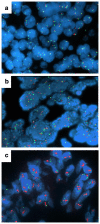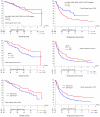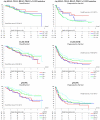Epidermal Growth Factor Receptor (EGFR) Pathway Biomarkers in the Randomized Phase III Trial of Erlotinib Versus Observation in Ovarian Cancer Patients with No Evidence of Disease Progression after First-Line Platinum-Based Chemotherapy
- PMID: 26004768
- PMCID: PMC4661131
- DOI: 10.1007/s11523-015-0369-6
Epidermal Growth Factor Receptor (EGFR) Pathway Biomarkers in the Randomized Phase III Trial of Erlotinib Versus Observation in Ovarian Cancer Patients with No Evidence of Disease Progression after First-Line Platinum-Based Chemotherapy
Erratum in
-
Erratum to: Epidermal Growth Factor Receptor (EGFR) Pathway Biomarkers in the Randomized Phase III Trial of Erlotinib Versus Observation in Ovarian Cancer Patients with No Evidence of Disease Progression after First-Line Platinum-Based Chemotherapy.Target Oncol. 2016 Jun;11(3):429. doi: 10.1007/s11523-016-0433-x. Target Oncol. 2016. PMID: 27056749 No abstract available.
Abstract
Background: In this work, we aimed to identify molecular epidermal growth factor receptor (EGFR) tissue biomarkers in patients with ovarian cancer who were treated within the phase III randomized European Organisation for Research and Treatment of Cancer-Gynaecological Cancer Group (EORTC-GCG) 55041 study comparing erlotinib with observation in patients with no evidence of disease progression after first-line platinum-based chemotherapy.
Methods: Somatic mutations in KRAS, BRAF, NRAS, PIK3CA, EGFR, and PTEN were determined in 318 (38 %) and expression of EGFR, pAkt, pMAPK, E-cadherin and Vimentin, and EGFR and HER2 gene copy numbers in 218 (26 %) of a total of 835 randomized patients. Biomarker data were correlated with progression-free survival (PFS) and overall survival (OS).
Results: Only 28 mutations were observed among KRAS, BRAF, NRAS, PIK3CA, EGFR, and PTEN (in 7.5 % of patients), of which the most frequent were in KRAS and PIK3CA. EGFR mutations occurred in only three patients. When all mutations were pooled, patients with at least one mutation in KRAS, NRAS, BRAF, PIK3CA, or EGFR had longer PFS (33.1 versus 12.3 months; HR 0.57; 95 % CI 0.33 to 0.99; P = 0.042) compared to those with wild-type tumors. EGFR overexpression was detected in 93 of 218 patients (42.7 %), and 66 of 180 patients (36.7 %) had EGFR gene amplification or high levels of copy number gain. Fifty-eight of 128 patients had positive pMAPK expression (45.3 %), which was associated with inferior OS (38.9 versus 67.0 months; HR 1.81; 95 % CI 1.11 to 2.97; P = 0.016). Patients with positive EGFR fluorescence in situ hybridization (FISH) status had worse OS (46.1 months) than those with negative status (67.0 months; HR 1.56; 95 % CI 1.01 to 2.40; P = 0.044) and shorter PFS (9.6 versus 16.1 months; HR 1.57; 95 % CI 1.11 to 2.22; P = 0.010). None of the investigated biomarkers correlated with responsiveness to erlotinib.
Conclusions: In this phase III study, increased EGFR gene copy number was associated with worse OS and PFS in patients with ovarian cancer. It remains to be determined whether this association is purely prognostic or is also predictive.
Figures




References
-
- Ciardiello F, Tortora G. EGFR antagonists in cancer treatment. N Engl J Med. 2008;358(11):1160–74. doi:10.1056/NEJMra0707704. - PubMed
-
- Yarden Y, Sliwkowski MX. Untangling the ErbB signalling network. Nat Rev Mol Cell Biol. 2001;2(2):127–37. - PubMed
-
- Skirnisdóttir I, Sorbe B, Seidal T. The growth factor receptors HER-2/neu and EGFR, their relationship, and their effects on the prognosis in early stage (FIGO I-II) epithelial ovarian carcinoma. Int J Gynecol Cancer. 2001;11(2):119–29. - PubMed
-
- Fischer-Colbrie J, Witt A, Heinzl H, Speiser P, Czerwenka K, Sevelda P, Zeillinger R. EGFR and steroid receptors in ovarian carcinoma: comparison with prognostic parameters and outcome of patients. Anticancer Res. 1997;17(1B):613–9. - PubMed
-
- Berchuck A, Rodriguez GC, Kamel A, Dodge RK, Soper JT, Clarke-Pearson DL, Bast RC., Jr Epidermal growth factor receptor expression in normal ovarian epithelium and ovarian cancer. I. Correlation of receptor expression with prognostic factors in patients with ovarian cancer. Am J Obstet Gynecol. 1991;164(2):669–74. - PubMed
Publication types
MeSH terms
Substances
Grants and funding
LinkOut - more resources
Full Text Sources
Other Literature Sources
Medical
Research Materials
Miscellaneous

